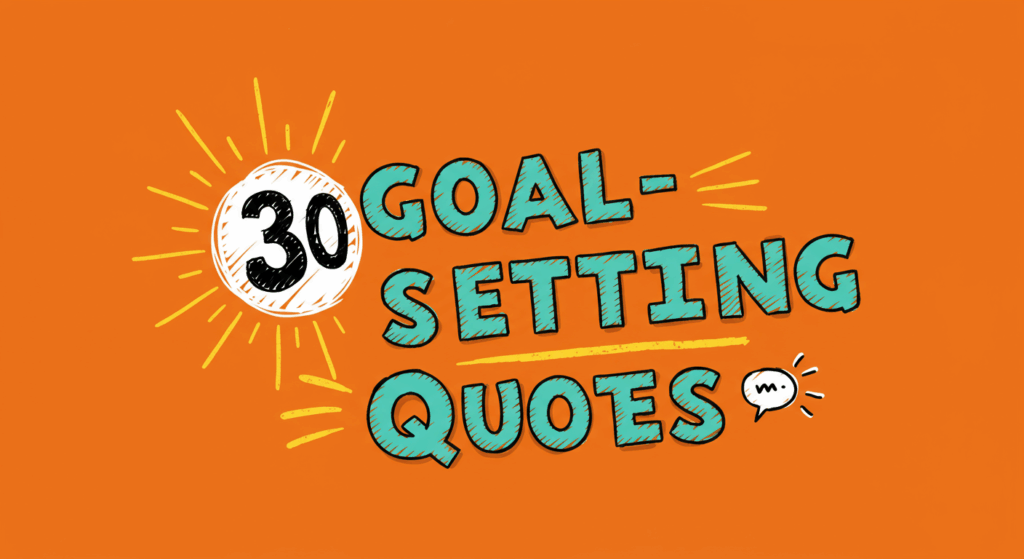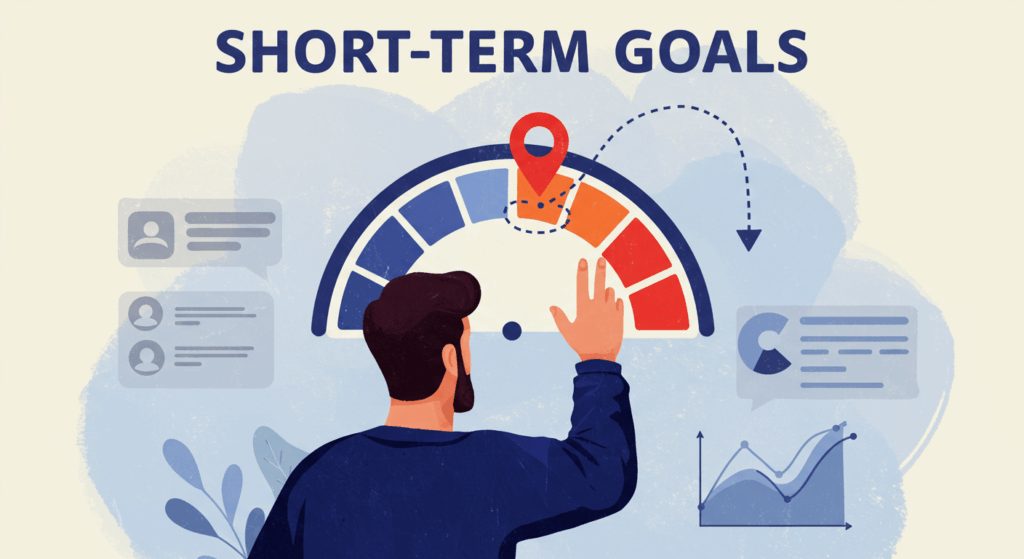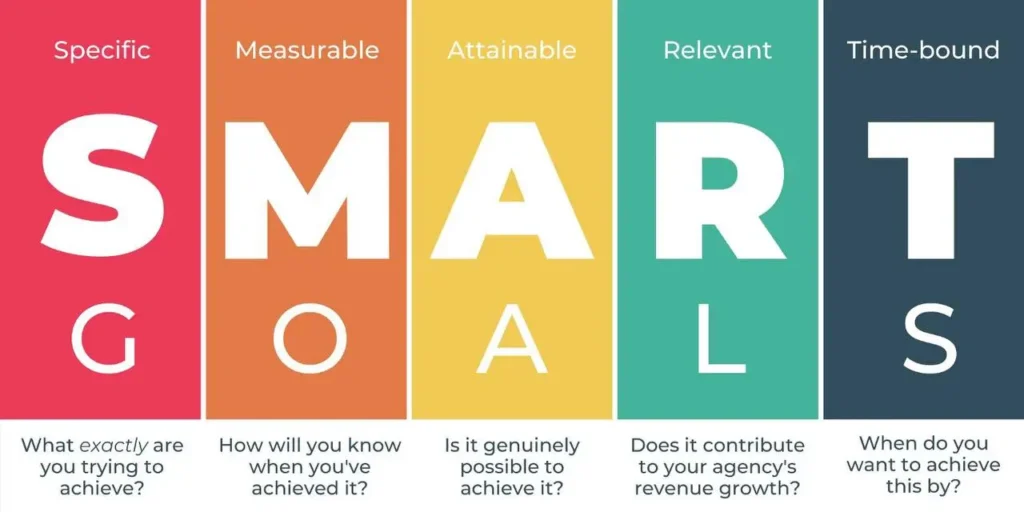So, let’s be real for a sec: life feels like this constant balancing act between chasing big dreams (like buying a house, landing that dream job, or maybe finally starting a podcast you’ve been talking about forever) and just… surviving today. And somewhere in between all the big life plans and everyday chaos, there’s this magical concept we always hear about: short-term goals.
If you’re anything like me, you’ve probably heard that phrase tossed around in school, work meetings, or maybe on TikTok while scrolling at 2 a.m. But what even are short-term goals? And more importantly, how the heck do they actually help with, like, careers and life stuff?
That’s what we’re diving into today. Don’t worry, it won’t be boring and stiff like some textbook explanation. We’re gonna talk about what short-term goals really mean, why they matter, how you can actually use them to level up your career (without losing your sanity), and some fun strategies you can try.
Grab a coffee (or boba, or energy drink—no judgment), and let’s go.
Okay, So What Even Is a Short-Term Goal?
Imagine this: you’re planning a road trip. You know the end destination (say, a beach weekend), but if you only focus on the final spot without stopping for gas, grabbing snacks, or figuring out which playlist you’ll vibe with, you’re not getting far. Those little pit stops? That’s basically what short-term goals are.
Short-term goals are the small, doable things you can accomplish in the near future—like in a day, a week, or a few months. They’re like stepping stones toward the bigger picture. Instead of saying, “I want to become the CEO of my own company,” a short-term version could be, “I’ll finish reading that book on leadership this month” or “I’ll apply to three jobs this week.”
And here’s the thing: short-term goals keep you moving. They give you that quick little dopamine hit when you check something off your list. You know that satisfying “ding” when you clear notifications? Yeah, same vibe.
Why Short-Term Goals Actually Matter (Even If They Feel Tiny)
Here’s the trap a lot of us fall into: we think the only goals worth setting are the massive ones. “Buy a house by 30,” “become a millionaire,” “write a best-selling novel.” (Okay, dramatic, but you get the point.)
The problem? Huge goals are overwhelming, and honestly, they sometimes feel too far away. That’s why short-term goals are the secret sauce.
They keep you motivated
It’s like leveling up in a video game. You wouldn’t grind for hours with zero checkpoints, right? Small wins give you that push to keep going.
They make big goals less scary
Breaking down a giant dream into smaller pieces feels way more doable. Instead of staring at the mountain, you’re just tackling one little hike at a time.
They help you stay focused
Our brains (especially in the TikTok era) love instant gratification. Short-term goals give your brain something concrete to latch onto instead of drifting into “meh, I’ll do it later” mode.
They’re flexible
Life changes. Careers shift. One day you’re sure you’ll be an architect, and the next you’re deep into digital marketing TikToks. Short-term goals are easy to adjust without tossing your whole life plan out the window.
Short-Term Goals Examples (So You’re Not Just Nodding Along)
Sometimes explanations are all nice, but examples make it real. So let’s say you’re in a few different stages of life or career—what could your short-term goals look like?
- Student vibes:
- Finish your essay two days before the deadline (instead of pulling that 3 a.m. “why do I do this to myself” session).
- Join one campus org and actually show up to the meetings.
- Polish your LinkedIn profile this weekend.
- First job energy:
- Ask your boss for feedback on one project this month.
- Network with two people in your industry (even if it’s just sliding into a professional DM, lol).
- Learn one new skill from YouTube or an online course before the quarter ends.
- Leveling up career mode:
- Update your resume to reflect that cool project you led.
- Schedule a coffee chat with a mentor.
- Apply for a stretch role within your company.
- Personal growth goals (because life isn’t just about work, right?):
- Go to the gym twice this week.
- Meditate for five minutes a day.
- Try cooking one new recipe (without burning the kitchen down).
See how none of these are crazy intimidating? They’re achievable, and they build momentum.
How to Actually Set Short-Term Goals Without Overthinking

Okay, so maybe now you’re like, “Cool, I get the meaning, but how do I do this without spiraling into a planning rabbit hole?” Been there. Let’s break it down.
1. Get super specific
Don’t just say “I want to get healthier.” Say, “I’ll drink 8 glasses of water every day this week.” Specific goals are easier to measure and track.
2. Set a realistic timeline
If you say you’ll learn Spanish fluently in 2 weeks, that’s not a short-term goal—it’s a setup for disappointment. Aim for something you can genuinely tackle soon.
3. Make it measurable
Instead of “I’ll save money,” try “I’ll put $50 into savings each paycheck for the next two months.” Numbers are your best friend here.
4. Keep it aligned with your big goals
Ask yourself, “Does this short-term goal actually help me get closer to what I want long-term?” If yes, go for it. If not, maybe it’s just a distraction.
5. Reward yourself (seriously)
Finished your short-term goal? Celebrate. Doesn’t have to be huge—a Netflix binge, a fancy coffee, or even just a moment to brag to your group chat.
Short-Term Goals and Careers: The Real-Life Link
Alright, let’s connect this to your career because that’s usually where the pressure hits hardest.
Short-term goals are like your career’s cheat codes. They help you prove progress, even if you’re not CEO yet. Employers love seeing growth, initiative, and self-improvement, and guess what short-term goals show? Exactly that.
Think of it this way: long-term, maybe you want to be a creative director. Your short-term moves could be:
- Building a portfolio of smaller projects.
- Shadowing someone senior for a few weeks.
- Taking an online design course.
Or if you’re aiming to move industries (say, finance to tech), your short-term checklist might be:
- Learning some basic coding.
- Attending a tech meetup.
- Applying to one entry-level job per week.
These baby steps make you more employable, confident, and honestly, less stressed about “figuring it all out” right now.
Career Strategies That Pair Well With Short-Term Goals
So how do you level up and make short-term goals part of your bigger career strategy? Here are a few hacks:
Network like it’s dating
Yeah, networking feels awkward sometimes, but treat it like swiping on a dating app—you don’t have to marry everyone, you’re just seeing who vibes with you. Start small: connect on LinkedIn, comment on someone’s post, or send a quick “hey, loved your article” DM. Those little actions can turn into big career doors later.
Keep learning (but in fun ways)
Career growth doesn’t always mean going back to school for years. Podcasts, YouTube tutorials, workshops—those count. Set a goal like “learn one new thing every week.” It stacks up fast.
Document your wins
Seriously, keep a “brag folder” on your laptop. Every time you get good feedback, finish a big project, or even help your team win something, save it. When it’s time for promotions or interviews, you’ve got receipts.
Stay flexible
The job market’s wild, ngl. AI, remote work, new industries popping up—it’s a lot. Short-term goals give you wiggle room to pivot. Don’t get stuck thinking you must stick to one plan forever.
Balance work + personal life
Short-term goals aren’t just career stuff. Want to avoid burnout? Set goals like “take a walk on lunch breaks” or “no work emails after 8 p.m.” Protecting your energy is just as strategic as climbing the ladder.
The Psychology Behind Short-Term Goals (A Tiny Nerd Moment)
Okay, quick brain science break (I promise it’s not boring). Our brains love rewards. When you hit a short-term goal, your brain releases dopamine—the feel-good chemical. That little buzz motivates you to keep going.
It’s like when Spotify gives you that “Your Year in Review” playlist and you’re like, “Wow, look at me, I did stuff.” Same with goals—our minds thrive on measurable progress.
That’s why breaking down goals works better than saying, “I’ll be successful someday.” Someday isn’t measurable. But “I’ll apply to 5 jobs this week”? Your brain can actually process and reward that.
Common Mistakes People Make with Short-Term Goals
Alright, time to spill some tea on the mistakes most of us (me included) make when trying to set these goals.
- Going too big, too fast: If your short-term goal looks suspiciously like a long-term dream, you’ll get discouraged.
- Not writing them down: Trusting your brain to remember? Bad idea. Write it in Notes, Notion, Google Calendar—whatever you use.
- Comparing your goals to others: Just because your friend is learning Python doesn’t mean you have to. Pick what matters to you.
- Forgetting to celebrate: Checking goals off without rewarding yourself feels like working overtime with no pay. Nah, treat yourself.
So, Short-Term Goals Meaning in Real Life
At the end of the day, short-term goals aren’t about fancy productivity systems or being hyper-perfect. They’re just practical, small steps that make life and career feel a little less overwhelming. They’re like training wheels—you won’t use them forever, but they make the ride smoother at the start.
And honestly, when you stack enough short-term wins, they build into something big. That’s the real magic.
Final Takeaway
If you’re feeling stuck, lost, or just straight-up unmotivated, start with one tiny short-term goal. Don’t wait for the “perfect moment” or some massive life plan. Just pick something small, specific, and doable this week.
Because, ngl, the truth is… nobody has it all figured out. We’re all just winging it, setting goals, failing some, crushing others, and adjusting as we go. The only difference between people who get where they want to be and those who don’t? They keep moving.
So, my friend: set that short-term goal today. Send the email. Apply for that job. Save the $20. Take the class. Write the first page.
You’ve got this. And who knows? A year from now, you’ll look back and realize all those little short-term steps added up to something way bigger than you expected.
Now go crush it ✨









